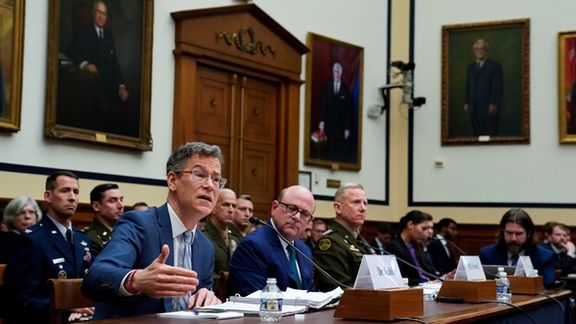US Officials Warn Of Iran’s ‘Global Threat’, Nuclear Potential

Iran can produce enough enriched uranium for one nuclear bomb in “about 12 days,” a top US official warned Tuesday as lawmakers also expressed deep concern.

Iran can produce enough enriched uranium for one nuclear bomb in “about 12 days,” a top US official warned Tuesday as lawmakers also expressed deep concern.
Under Secretary of Defense for Policy, Colin Kahl, said: “Back in 2018, when the previous administration decided to leave the JCPOA it would have taken Iran about 12 months to produce one bomb's worth of fissile material. Now it would take about 12 days.”
It is the most alarming warning yet of the threat Iran's nuclear capabilities pose. In September, Israel’s then defense minister, Benny Gantz, told the International Atomic Energy Agency in Vienna that Iran would be able to produce enough enriched uranium to make three nuclear warheads within a few weeks.
US officials have repeatedly estimated the time it would take to acquire the fissile material for a nuclear bomb to be a matter of weeks but have not yet been as specific as Kahl was. Speaking to a House of Representatives hearing, he admitted that "Iran's nuclear progress since we left the JCPOA has been remarkable,” sending a clear warning that the Islamic republic had become a global threat.
Iran began violating the JCPOA enrichment limit set at 3.67 percent in 2019 when the Trump administration imposed full oil export sanctions but until the Biden administration came to office higher enrichment had stayed at around 5 percent.
In early 2021, Tehran toughened its position and said it would begin to enrich uranium to 20 percent purity, as the new US administration signaled its readiness to open talks to revive the JCPOA. Later Iran increased enrichment to 60 percent, which has no civilian use.
Kahl said that though the US would prefer to take the diplomatic approach to resolving the nuclear issue, it was unlikely since the recent breakdown in talks meant that “right now, the JCPOA is on ice”.
Talks to revive the JCPOA that began in April 2021 reached a deadlock last September and the administration insists it is no longer focused on reviving the accord.
The UN nuclear watchdog, the International Atomic Energy Agency (IAEA) that monitors Iran’s nuclear program was quoted Tuesday as confirming that its inspectors have found traces of uranium enriched to 84 percent – just a short step away from 90-percent enrichment needed for bomb material.
Many lawmakers from both sides of the aisle oppose lifting US economic sanctions on a country that is engaged in repression at home and “malign activities” abroad, including arming Russia with drones and possibly other weapons.
Democratic Senator Bob Menendez, Chairman of the foreign relations committee told Iran International Tuesday that the Biden administration should understand that rather than Iran changing its way, “on the contrary, it is doubling down”.
He did, however, express hope that Iran’s alarming 84-percent enrichment would bring about a shift in Biden’s policy.
Iran’s wider role in global conflict was addressed on Tuesday at a media call with Deputy Assistant Secretary of Defense Dana Stroul, who told reporters that the US and its allies are moving to treat the Islamic Republic as a "global threat”, because of its growing military alliance with Russia.
"We are now at a point where Iranian threats are no longer specific to the Middle East, but a global challenge," she said, reinforcing recent warnings by senior administration officials.
"It is reasonable to expect that the tactics, techniques and procedures that the Iranians are learning and perfecting in Ukraine will one day come back to our partners in the Middle East, which is why we are increasing cooperation now, intelligence sharing, understanding these networks and increasing our collective defensive capabilities so that we are prepared to counter these threats in the region," she added.